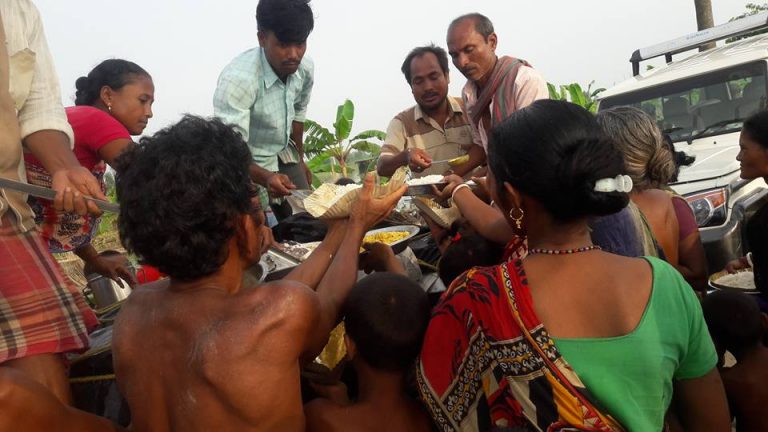
The first I knew of 16 million people inundated by floodwater were the photos from a friend on Facebook.
Outstretched hands, bare shoulders, muddy torrents: they were the first of what I expected to be a mainstream media deluge. Instead: silence. Families across Nepal, India and Bangladesh have been drowned, buried alive and starving for almost a month now, it turns out, and the media vacuum is profound.
This is South Asia’s annual monsoon nightmare – the natural disaster that no longer makes the news. Yes, we #prayfor the victims of terror attacks in Charlottesville and Barcelona, but at the same time a bus full of school children in Nepal is buried alive by a landslide. It’s the second in a week, and these families are just a handful of the sixteen million people in the last month who are losing everything to forces they can’t control. There are no hashtags; only the prayers of the families themselves, who sleep in the rain while their bellies growl for food and their hearts long for the dead.
I guess there are a few factors at play in the world’s collective shrug in the direction of the disaster. The numbers – so huge it’s hard to imagine. The inevitability – South Asia ‘always floods’. The media – it feeds the appetites we offer up, and we have little interest in floods. We don’t even know what we don’t know. We’re preoccupied with family, work stresses and the routines of every day life.
In the midst of it all, perhaps some pray for the less fortunate, a blanket offering for anyone doing it tough, and idly wonder at times why God doesn’t intervene more often in a crisis.
The fact is, God does. I think of my friend who is part of the Church of North India. I’ve not only visited her in the urban settlements where she works beside those who’ve fallen through the cracks in her society, but over the last few days I’ve watched on Facebook as she wades through flood waters to deliver dhal and black plastic to families who have seen their homes washed away. God is present in and through people like Nita, who act out what it means to be God’s light and love within the world.
 Although we may not be able to gag Mother Nature, we have been given the means to prevent these disasters before they become sixteen-million-life tragedies. After all, we know that monsoon rains will reliably take the lives of men, women and children in India, Bangladesh and Nepal, year after year, simply because they live in low lying areas, in homes that are badly built, beside rivers that will swell and swallow them whole: they’re too poor to move elsewhere. It won’t be flooding that kills these people and their livelihoods. It will be the lack of evacuation plans, poor communication, homes built on the side of mountains where they shouldn’t be, and outbreaks of disease. In short, it’ll be poverty, and the lack of opportunity that comes with it.
Although we may not be able to gag Mother Nature, we have been given the means to prevent these disasters before they become sixteen-million-life tragedies. After all, we know that monsoon rains will reliably take the lives of men, women and children in India, Bangladesh and Nepal, year after year, simply because they live in low lying areas, in homes that are badly built, beside rivers that will swell and swallow them whole: they’re too poor to move elsewhere. It won’t be flooding that kills these people and their livelihoods. It will be the lack of evacuation plans, poor communication, homes built on the side of mountains where they shouldn’t be, and outbreaks of disease. In short, it’ll be poverty, and the lack of opportunity that comes with it.
You know what we need to save these lives? We need vision. And if it all looks too hard, too big, too far away and too hard, who better to take on all that but a community who passionately believe that life is possible from death? We can beat this giant. We already know that $1 invested to reduce risks and prepare communities for disaster saves $15 in recovery efforts after a cyclone, flood or earthquake hits. That’s not just lives saved, but good economic sense – an achievable, smart investment.
If there’s anything I believe as a follower of Christ, it’s that transformation is possible. Not just individual lives turned around, but whole systems shaken to their core. Institutionalised human slavery – ended. Children valued and universal education won, wrought from a world where babies where routinely discarded on mountainsides to die. Diseases eradicated. Women’s rights championed. In all of these cataclysmic wins, Christians have been at the forefront with a vision for things that must, at the time, have seemed impossible.
So it is with saving lives before natural disasters strike. As a changing climate increases the severity and frequency of extreme weather, especially in our own Asia/Pacific region, we’ll need to be smarter and more determined about the ways we protect ourselves – and especially our most vulnerable – from tragedy. Allowing sixteen million lives each year to sink beneath muddy waters simply isn’t an option.
When we’re tempted to ask why God doesn’t intervene more directly in natural disasters, perhaps the better question to ask is: why don’t we? Big change, bold vision: this is our call, this is our identity. And as droughts, floods, cyclones, and famines increasingly stalk our world, this is the challenge we’re called on to meet – before disasters become tragedies.
UnitingWorld has launched an appeal to support partner churches in the Pacific as they build critical resilience to disasters and climate change. Donate now: https://unitingworld.org.au/stop-disasters-becoming-tragedies/
